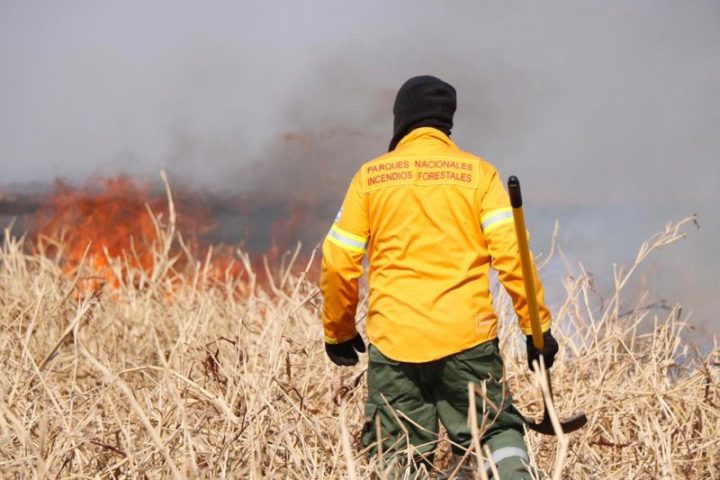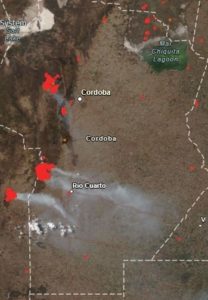Wildfires have been raging in central and northern Argentina for months where more than 400,000 hectares (988,422 acres), comparable in size to more than 560,000 soccer fields, have burned to date. According to the latest data from the National Fire Management Service, thirteen of Argentina’s twenty-three provinces are affected, with a consequential loss of natural ecosystems and biodiversity.
The first wildfire outbreaks were registered in the Paraná River Delta in February and reached a peak in August when another large wildfire began spreading in the central province of Córdoba.
The Argentine federal government is now joining forces with affected provinces, bringing in fire brigades and equipment along with aid from other provinces.
Human activity, specifically clearing land for livestock or farming, is thought to be the main culprit for the fires according to the Secretary of Environmental Control and Monitoring in an interview with Argentine media outlet Chequeado:
Climate factors such as high temperatures, strong winds, and extreme droughts have aggravated the situation, causing the out-of-control fires to move increasingly closer to urban centers.
Shocking images of the wildfires from the city of Córdoba have caused public outrage as reports continue to point to agribusiness and real estate projects in protected areas and native forests as the cause for the wildfires. The public is also blaming the irresponsible management of the so-called “controlled burning” of grasslands. Philosophy professor Constanza San Pedro and activist Clarisa Mensa wrote in a local outlet:
People expressed their indignation and sadness through Twitter and other social media platforms with tags including #ArgentinaEnLlamas, #ApaguenElFuego, #BastaDeQuemas and #LeydeHumedalesYA (In English: Argentina in Flames, Stop the Fire, Enough Burning, and Law for Wetlands NOW), among others.
"Sólo después de que el último árbol esté muerto, sólo después de que el último río haya sido envenenado, sólo después de que el último pez haya sido atrapado, sólo entonces nos daremos cuenta que no nos podemos comer el dinero"#ArgentinaEnLlamas literalmente. #LeyDeHumedalesYa pic.twitter.com/ViTZ0zNX5J
— Guillermina (@GuilleBrun0) October 2, 2020
“Only after the last tree is dead, only after the last river has been poisoned, only after the last fish has been caught, only then will we realize that we cannot eat the money”#ArgentinaEnLlamas, literally.
#LeyDeHumedalesYa pic.twitter.com/ViTZ0zNX5J
— Guillermina (@GuilleBrun0) October 2, 2020
¿Quiénes están quemando la Argentina?
Se está llevando adelante un #Ecocidio. Los Humedales en el Paraná, la sierra de Córdoba y más lugares por todo nuestro país.
Se habla de las quemas, no de quienes las están quemando.
[Abro Hilo?]#LeyDeHumedalesYa#ArgentinaEnLlamas pic.twitter.com/XxxTyqhtWS
— Lisandro Citta (@LisandroCitta) October 3, 2020
Who is burning Argentina?
An #Ecocide is taking place. The Wetlands in the Paraná, the Sierra de Córdoba and more places throughout our country.
They talk about the burning, not about those who are burning it.
[Open Thread?]#LeyDeHumedalesYa#ArgentinaEnLlamas pic.twitter.com/XxxTyqhtWS
— Lisandro Citta (@LisandroCitta) October 3, 2020
El país arde por el agronegocio y la especulación inmobiliaria. Donde hubo fuego, hoy hay soja y máquinas listas para la construcción… #ArgentinaEnLlamas pic.twitter.com/TzEohagBYB
— ?Cele Fierro? (@Cele_Fierro) October 2, 2020
The country burns because of agribusiness and real estate speculation. Where there was fire, today there are soybeans and machines ready for construction…
#ArgentinaEnLlamas pic.twitter.com/TzEohagBYB
— ?Cele Fierro? (@Cele_Fierro) October 2, 2020
Un amigo, que está combatiendo los incendios en la zona del Delta, hizo un compilado con la situación de todo el país. Están pidiendo que el reclamo llegue a la ONU. Difundir!!@unep_espanol #ArgentinaEnLlamas #ONUHelp pic.twitter.com/fhQBep86Ih
— Lucila Guevara (@LalaBonariensis) October 2, 2020
A friend, who is fighting the fires in the Delta area, made a video compilation of the entire country’s situation. They are asking that this reach the UN. Spread Word!!
@unep_espanol #ArgentinaEnLlamas #ONUHelp pic.twitter.com/fhQBep86Ih
— Lucila Guevara (@LalaBonariensis) October 2, 2020
Although a Forest Law was passed in 2007 which established a national fund for native forest conservation, several reports indicate non-compliance by authorities and continued illegal logging. This is a big reason why different political parties, organizations, and activists are working to promote more specifically tailored laws that prohibit the sale of burned areas in order to discourage arson.
During the last few months, thirteen wetland protection bills were presented, mainly for the Paraná Delta area. It is hoped that mounting social pressure will encourage and speed up the process of approval before it is too late.
#LeyDeHumedalesYa #CorrientesEnLlamas pic.twitter.com/88U8B8Rf2H
— Casandraadalis (@Casandraadalis2) October 3, 2020
Written by Romina Navarro / Stephanie Crane











